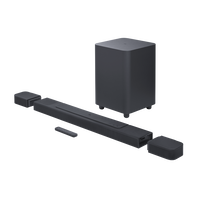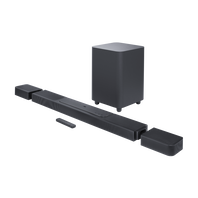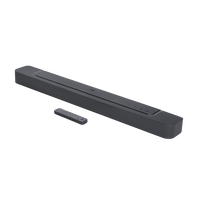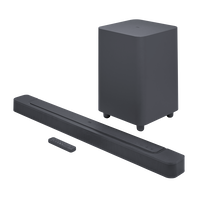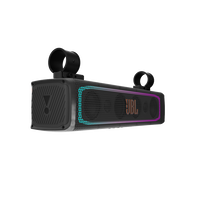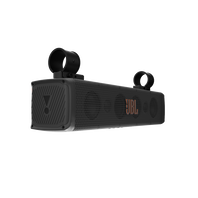SoundBars
-
JBL Bar 1000MK2
7.1.4 channel soundbar system with detachable surround speakers, MultiBeam 3.0™, Dolby Atmos® and DTS:X®
Introduction Year: 2025View product -
JBL Bar 1300MK2
11.1.4 channel soundbar system with detachable surround speakers, MultiBeam 3.0™, Dolby Atmos® and DTS:X®
Introduction Year: 2025View product -
JBL Bar 300MK2
5.0 channel all-in-one compact soundbar with MultiBeam™ 3.0 and Dolby Atmos®
Introduction Year: 2025View product -
JBL Bar 300MK2
5.0 channel all-in-one compact soundbar with MultiBeam™ 3.0 and Dolby Atmos®
Introduction Year: 2025View product -
JBL Bar 500MK2
5.1 channel soundbar system with MultiBeam™ 3.0 and Dolby Atmos®
Introduction Year: 2025View product -
JBL Bar 800MK2
7.1 channel soundbar system with detachable surround speakers, MultiBeam 3.0™, and Dolby Atmos®
Introduction Year: 2025View product -
JBL Cinema SB180
The JBL Cinema SB180 soundbar offers 110W RMS of maximum power and ARC HDMI connection
Introduction Year: 2024View product -
JBL Cinema SB510
3.1 Channel Soundbar with a Built-in Subwoofer
Introduction Year: 2024View product -
-
-
JBL Cinema SB580
3.1 Channel Soundbar with Virtual Dolby Atmos® and Wireless Subwoofer
Introduction Year: 2024View product -
JBL Cinema SB590
3.1 Channel Soundbar with Virtual Dolby Atmos® and Wireless Subwoofer
Introduction Year: 2024View product -
JBL BAR 1000
7.1.4-channel soundbar with detachable surround speakers, MultiBeam™, Dolby Atmos®, and DTS:X®
Introduction Year: 2023View product -
JBL BAR 1300
11.1.4-channel soundbar with detachable surround speakers, MultiBeam™, Dolby Atmos® and DTS:X®
Introduction Year: 2023View product -
JBL BAR 1300X
11.1.4-channel soundbar with detachable surround speakers, MultiBeam™, Dolby Atmos® and DTS:X®
Introduction Year: 2023View product -
-
JBL Bar 2.1 Deep Bass (MK2)
2.1 channel soundbar with wireless subwoofer
Introduction Year: 2023View product -
JBL BAR 300
5.0-channel compact all-in-one soundbar with MultiBeam™ and Dolby Atmos®
Introduction Year: 2023View product -
JBL Bar 5.0 MultiBeam
5.0 channel soundbar with MultiBeam™ technology and Virtual Dolby Atmos®
Introduction Year: 2023View product -
JBL BAR 500
5.1-channel soundbar with MultiBeam™ and Dolby Atmos®
Introduction Year: 2023View product -
JBL BAR 700
5.1-channel soundbar with detachable surround speakers and Dolby Atmos®
Introduction Year: 2023View product -
JBL BAR 800
5.1.2-channel soundbar with detachable surround speakers and Dolby Atmos®
Introduction Year: 2023View product -
-
-
JBL RALLYBAR
21" Bluetooth® Universal Outdoor Vehicle Soundbar with LED lights and 150Wrms amplifier
Introduction Year: 2023View product -
JBL RALLYBAR S
21" Bluetooth® Universal Outdoor Vehicle Soundbar with 150Wrms amplifier
Introduction Year: 2023View product -
JBL RALLYBAR XL
35" Bluetooth® Universal Outdoor Vehicle Soundbar with LED lights and 300Wrms amplifier
Introduction Year: 2023View product -
JBL Cinema SB190
2.1 Channel soundbar with Virtual Dolby Atmos and wireless subwoofer
Introduction Year: 2022View product -
-
Can’t find what you’re looking for?

Call Us
To speak to our customer service specialist
1800-102-0525
Mon - Sun: 10:00 am - 7:00 pm (IST)












